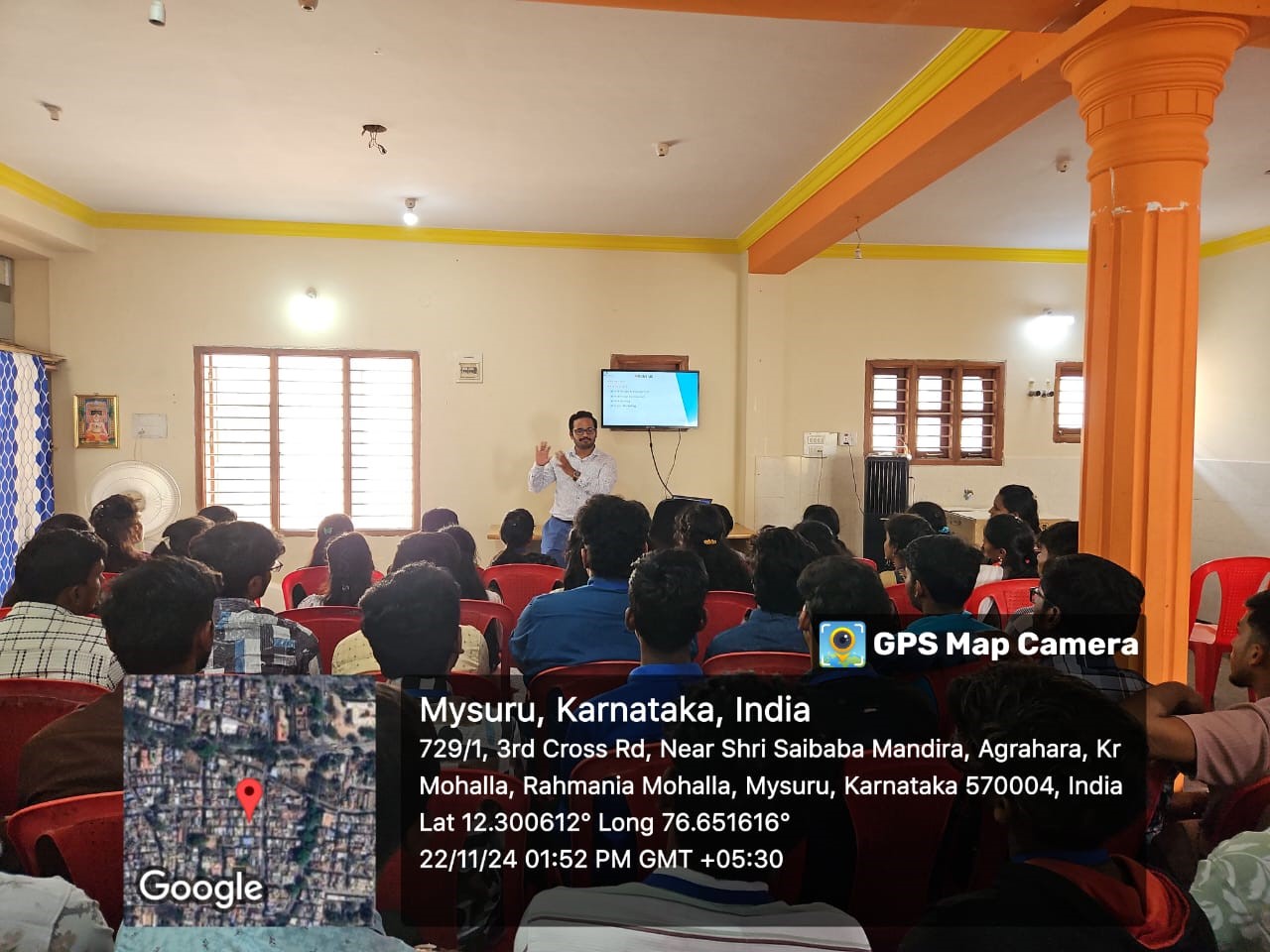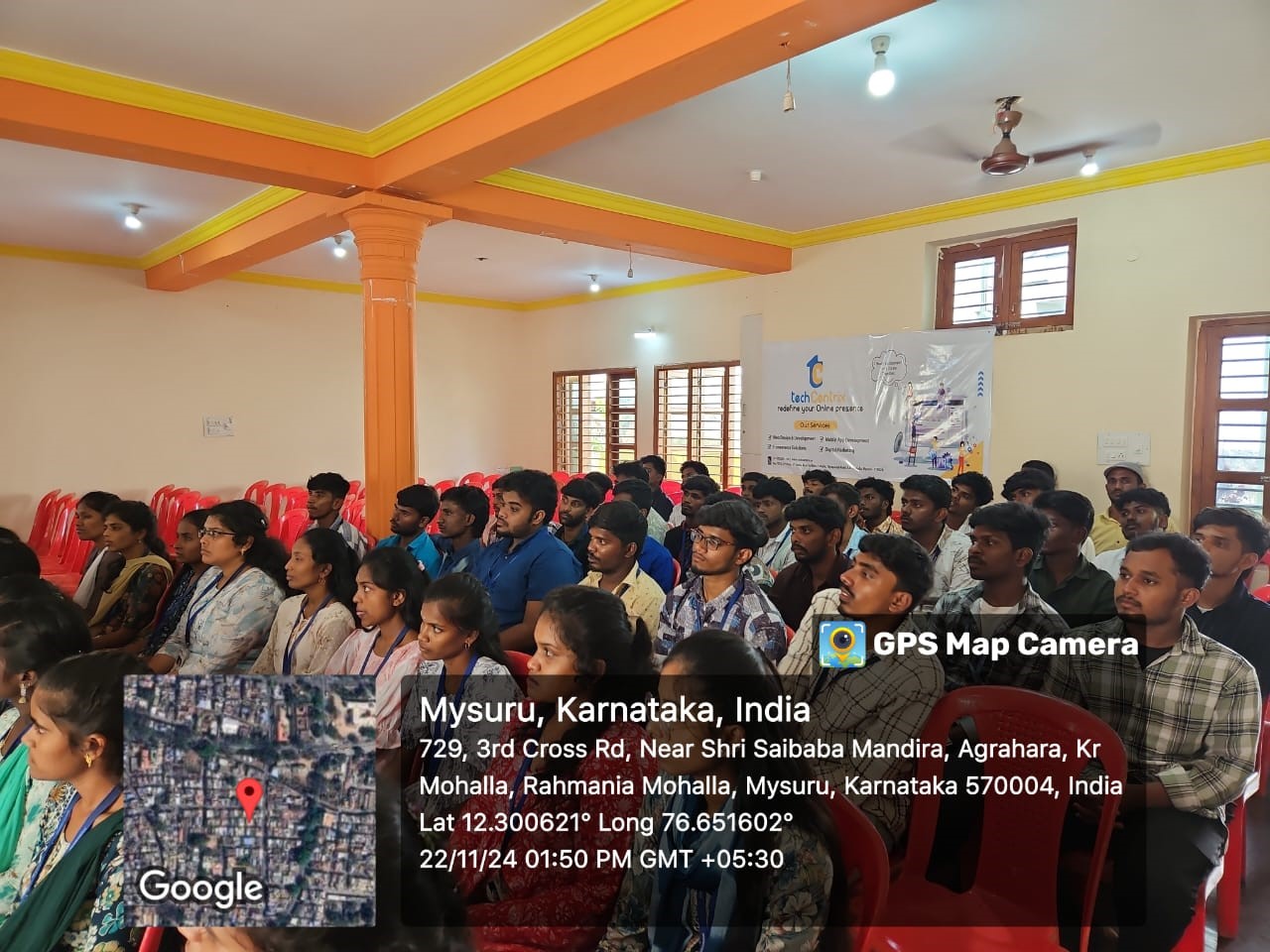Established in 2021 with an initial intake of 120 students, the Department of Information Technology is committed to providing a transformative educational experience. Our highly collaborative and experienced faculty equips graduating engineers with the tools for exceptional performance, enabling them to thrive in the dynamic digital landscape.
The Department boasts state-of-the-art computing facilities, including three labs equipped with 120 high-performance workstations and the latest software. Students enjoy free, unlimited internet access. To facilitate practical learning, laboratory hours have been extended, allowing students to work on independent projects and gain valuable hands-on experience. The department is staffed by a team of highly qualified faculty and technical staff. The curriculum and syllabus are continuously updated based on feedback from industry partners, alumni, and current students, ensuring relevance and quality. To enhance students' technical writing and communication skills, they are encouraged to contribute technical articles on topics to the department magazine."
Students are actively encouraged to participate in technical seminars and competitions, both on and off campus, fostering their professional development and enhancing their leadership and communication skills. To refine technical communication skills, students contribute articles to the department magazine. The Department has established strategic partnerships through MoUs with leading organizations. Through the Campus Connect Program, providing industry-relevant training and placement assistance. These partnerships equip students with the technical and soft skills necessary to meet the growing demands of the IT industry and enhance student placement outcomes.
The Department has been permanently affiliated with Anna University.
Prepare the students to lay their hands and feet in designing and developing the information technology based solutions in all walks of life.
Expose and train the faculty members in ever changing technology arenas.
Provide best infrastructure and educational resources for students to help in self-learning and practice.
Help in creating social awareness among the stakeholders on the commitment and accountability.
Create a congenial environment for doing research and development in emerging and interdisciplinary fields.
The graduates from this department have become professional engineers, and are employed in software companies. They have become successful Software developers and Managers in the leading software top companies such as TCS, Wipro, Microsoft, Google, Infosys, Accenture, HCL, Facebook, Cognizant, Adobe, Oracle, Sun Microsystems, Flipkart, IBM, etc. The department has signed MOUs with various industries and leading organizations.
The department offers continuous learning through various FDP, STTP, Conferences, Seminars, Guest lectures and workshop in order to lay a strong foundation in academic.
To be the department that imparts professional computing training and makes competent engineer to work in the emerging areas of information technology field.
| S.No | Name of the Faculty | Qualification (With Specialization) |
Designation |
|---|---|---|---|
| 1 | Mrs. D. Latha | M.E | Assistant Professor |
| 2 | Mrs. A. Abirami | M.E | Assistant Professor |
| 3 | Mrs. R. Mekala | M.E | Assistant Professor |
| 4 | Mrs. K. Gowsalyaa | M.E | Assistant Professor |
| 5 | Mrs. R. Jayanthi | M.E | Assistant Professor |
| 6 | Mr. D. Manikanda Prabu | M.E | Assistant Professor |
| 7 | Mrs. S. Saranya | M.E | Assistant Professor |
| 8 | Mrs. P. Prabha | M.E | Assistant Professor |
| 9 | Mrs. K. Sathiyapriya | M.E | Assistant Professor |
| 10 | Mrs. S. Kavitha | M.E | Assistant Professor |
| 11 | Mrs. M. Gayathri | M.E | Assistant Professor |
| 12 | Mr. P. Purushothaman | M.E | Assistant Professor |
| 13 | Mrs. M. Latha | M.E | Assistant Professor |
| 14 | Mrs. S. Ramya Preethi | M.E | Assistant Professor |
| 15 | Mrs. S. Uma | M.E | Assistant Professor |
| 16 | Mrs. K. G. Lavanya | M.E | Assistant Professor |
| 17 | Mrs. D. Sharmila | M.E | Assistant Professor |
| 18 | Mrs. P. Nandhini | M.E | Assistant Professor |
| 19 | Mrs. A. Sowendariya | M.E | Assistant Professor |
| 20 | Mrs. P. Sugeertha | M.E | Assistant Professor |
| 21 | Mrs. D. Suganthi | M.E | Assistant Professor |
| 22 | Mrs. M. Vadivel | M.E | Assistant Professor |
| 23 | Mrs. G. Ramyajayanthi | M.E | Assistant Professor |
| 24 | Mr. S. Arunkumar | M.E | Assistant Professor |
| 25 | Mrs. B. Saranya | M.E | Assistant Professor |
| 26 | Mrs. R. Sujitha | M.E | Assistant Professor |
| 27 | Mr. D. Jeeva | M.E | Assistant Professor |
| S.No | Members | Name & Designation | College / Organization Name and Address |
|---|---|---|---|
| 1. | Chairperson | Dr.R.Umamaheswari Head of the Department Computer science and Engineering |
Gnanamani College of Technology |
| Description | Count |
|---|---|
| Scholars | 03 |
| Book Publication | 2 |
| Journal | 60 |
| Patent | 4 |
| S.NO | Name of the institution/ industry/ corporate house | Month and Year of signing MoU | Duration |
|---|---|---|---|
| 1 | Training Trains Software Technologies & Institute, Erode | Jun - 2023 | 3 Years |
| 2 | TrueLine Research Private Limited, Salem | Aug – 2023 | 3 Years |
| 3 | Neuraai Solutions Private Limited, Namakkal | May - 2023 | 3 Years |
| 4 | Uriht Solutions Private Limited, Namakkal | Dec - 2024 | 3 Years |
| S.NO | BATCH | TOTAL STRENGTH | PLACED STUDENTS COUNT | PERCENTAGE |
|---|---|---|---|---|
| 1 | 2021-2025 | 60 | 31 | 51% |
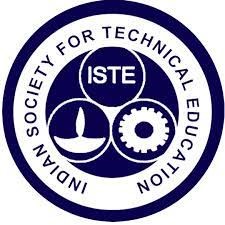

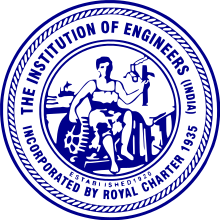

| S.NO | Year | Source | Worth |
|---|---|---|---|
| 1 | 2023-2024 | MSME WOMEN ENPOWERMENT 2.0 | 1,26,000/- |
| S.NO | Academic Year | Semester | Club Name | Course / program Name | Duration / Date | Student’s Attended |
|---|---|---|---|---|---|---|
| 1 | 2024-2025 | ODD | CODING CLUB | Technological Entrepreneurship in No Code Development | 1 Day 09-11-2024 |
60 |
| 2 | 2024-2025 | ODD | CODING CLUB | Coding Your Way to Success: Entrepreneurial Opportunities in Software Development | 2 Day’s 27-08-2024 to 29-08-2024 |
96 |
| 3 | 2024-2025 | ODD | Multimedia & IoT Club | Idea Presentation | 1 Day 29-08-2024 |
90 |
| S.NO | Academic Year | Sem | Type of the Program | Name of the program | Date | Total Students Participated | Whether the program is organized by / Professional Body (Name)/MOU Industry(name)/General |
|---|---|---|---|---|---|---|---|
| 1 | 2024-2025 | ODD | Alumni Talk Series | Innovative Practices and Skill Enhancement for Students Corporate Career | 24/08/2024 | Second Year IT Students | Mr. S. Balasurya, QMS Engineer, Plintron, Chennai. |
| 2 | 2024-2025 | ODD | Seminar | Coding your way to Success: Entrepreneurial Opportunities in Software Development | 27/08/2024 | Third Year IT Students | Er. Mohanraj Ravi, Team Lead, Neu Infotech, Salem |
| 3 | 2024-2025 | ODD | Seminar | Demo Day / Idea Presentation | 29/08/2024 to 30/08/2024 | 108 Participants from various Departments | Dr. D. Kamalakannan, Innovation Ambassador |
| 4 | 2024-2025 | ODD | National Level Technical Symposium | GNAN WHIZKID 2K25 | 25/10/2024 | 200 Participants from various Colleges | Mr. ANIL KUMAR, AVP – DIGITAL Solutions & Projects, Changepond Technologies, Chennai, Tamilnadu, India. |
| 5 | 2024-2025 | ODD | Guest Lecture | No More Coding | 09/11/2024 | Third Year IT Students | IIC and ISTE by Mr. Sathish Kumar V C, Senior Manager, Tech Mahindra, Chennai. |
| 6 | 2024-2025 | EVEN | Workshop | Design Thinking for Innovation: Apply Design thinking principles to generate Innovative solutions and ideas | 05.02.2025 to 06.02.2025 | Third Year IT Students | Mr. V. Manoj Dev, Senior Software Engineer, Aiverz Technology, Chennai |
| 7 | 2024-2025 | EVEN | Seminar | Power BI Technology: Unlocking the future of Business Intelligence in Tech Entrepreneurship | 02.05.2025 | Third Year IT Students | Mr. Mohammed Azarudeen AS, Technical Lead & Corporate Trainer,SDLC, Coimbatore |
| S.NO | Type of the Program (Symposium, Conference, Seminar, Webinar, Workshop, Guest Lecture, IV, If others mention) | Name of the program | Date | Total Students Participated | Resource person details |
|---|---|---|---|---|---|
| 1 | Alumni Talk Series | Vulnerability Management – Cyber Security | 21.08.2023 | 100 | Ms. Jeevitha Balamurugan, Consultant – Cyber Security Risk, General Mills, India. |
| 2 | Seminar | Accelerators / Incubation Opportunities for students, faculties early stage Entrepreneurs | 29.08.2023 | 114 | Dr. V. Nagaraj, Co-founder & Chief Innovation Officer, Starnet Pvt. Ltd, Salem |
| 3 | Seminar | Seminar on My story motivational session by successful entrepreneur / Startup Founder | 15.09.2023 | 110 | Dr. A. Athif Shah, Founder and CEO, ABE Groups, Chennai |
| 4 | Webinar | Entrepreneurship and Resilience: How women can overcome challenges in business and as a professional | 21.09.2023 | IT girl Students | Dr. Logeswari Jeyaraj, MBBS, MRCP (UK), Haematology, Kings College Hospital, London |
| 5 | Guest Lecture | Intellectual Property Rights and Entrepreneurship | 16.10.2023 | All IT Students | Dr. S. Karthi Prem, Professor/CSE, Shree Sathyam College of Engg. and Technology, Salem |
| 6 | Inaugural function and Guest Lecture | Good and Secure Code | 16.10.2023 | All IT Students | Dr. Rajasekar Velswamy, Associate Professor/CSE, SRM University, Chennai |
| 7 | National Level Technical Symposium | GNAN WHIZKID 2K23 | 27.10.2023 | 287 | Mr. Nandhakumar Vadivel, Sales Director (Cyber Security), HCL Technologies, Chennai |
| 8 | National Level Faculty Development Program | Theory and Applications of Symbolic Computing – with Artificial Intelligence Perspective (Sessions 1–5) | 01.12.2023 & 02.12.2023 | Faculty Members | Prof. E. G. Rajan, Director and Founder, Pentagram Research Center and MED Vision PVT. LTD, Hyderabad, USA |
| 8 | National Level Faculty Development Program | Research Methodologies (Session 6) | 02.12.2023 | Faculty Members | Dr. Rajasekar Velswamy, Associate Professor/CSE, SRM University, Chennai |
| 8 | National Level Faculty Development Program | Teachers now and then, Update is Mandatory, Why? (Session 7) | 02.12.2023 | Faculty Members | Mr. G. Nagasoundappan, CEO, SSS Group Of Companies, Pallipalayam |
| 9 | Alumni Talk Series | Innovations in Sharepoint and React JS | 23.12.2023 | II IT Students | Ms. A. Vaishanavi, Associate Engineer, Enoah I Solutions Pvt Ltd, Coimbatore |
| S.NO | Students Activities | No. of Students Participated |
|---|---|---|
| 1 | Journals/Conference Published | 60 |
| 2 | Symposium Paper Presentation / Seminar / Workshop / other Events | 887 |
| 3 | Project Presentation | 6 |
| 4 | Implant Training / Internship / Extension Activities | 180 |
| 5 | Value Added Course / Worth Mentioning Achievements | 350 |
| 6 | Prize Winners | 44 |
| PARTICULARS | Numbers |
|---|---|
| Total No. of Titles | 200 |
| Total No. of Volumes | 235 |
| Total No. of e-Journals | 40 |
| Total No. Printed Journals | 2 |
The Second year students of Information Technology department have undertaken field visits to the Nest Soft Technologies at Kochin, Kerala on 28.02.2025.
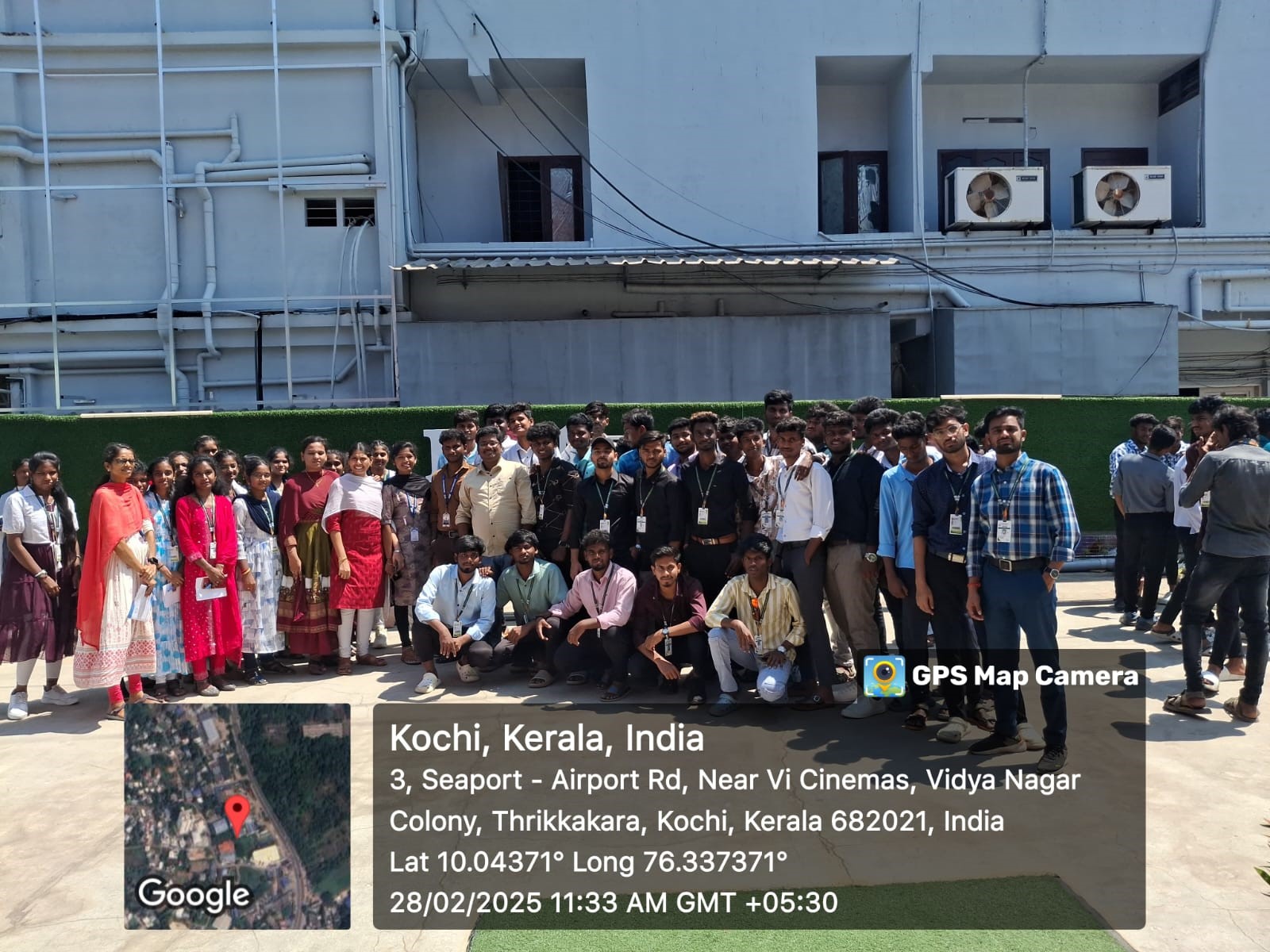
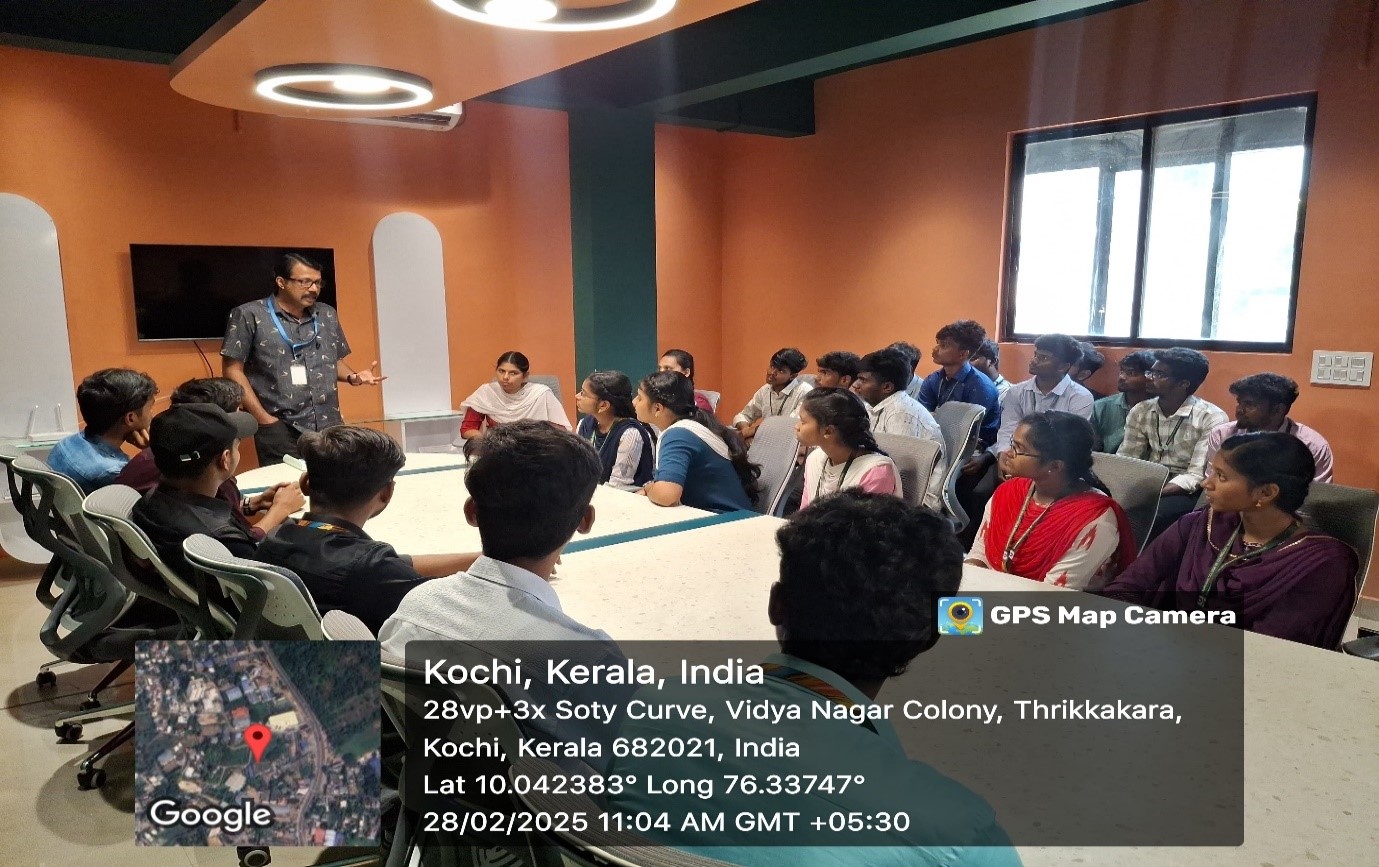
Third year students of the Information Technology have completed an Industrial Visit to TechCentrix at Mysuru, Karnataka on 22.11.2024
